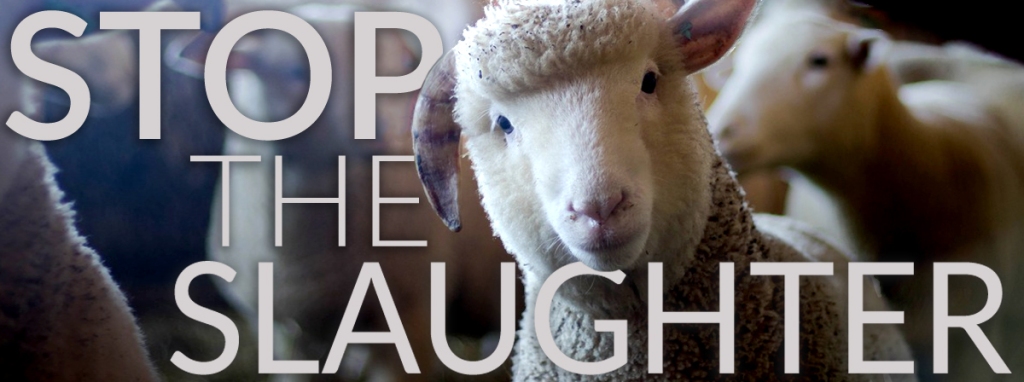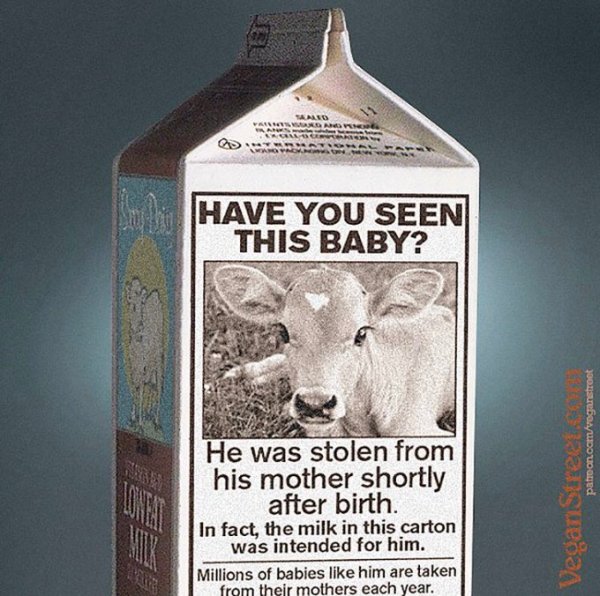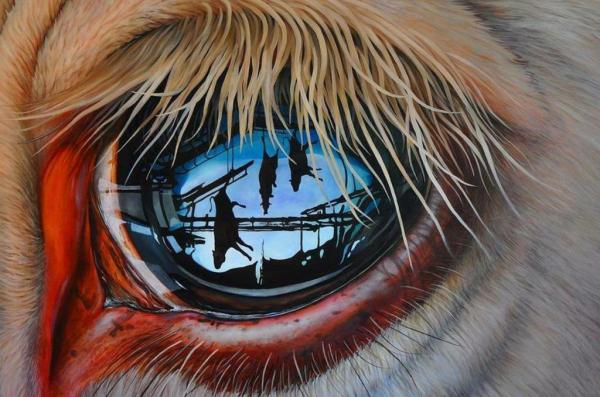English and Speciesism
English and Speciesism
By Joan Dunayer
Standard English usage perpetuates speciesism, which is the failure to accord nonhuman animals equal consideration and respect. Like racism or sexism, speciesism is a form of prejudice sustained in part by biased, misleading words. However, whereas racist slurs rightly elicit censure, people regularly use, and fail to notice, speciesist language. Unlike sexist language, speciesist language remains socially acceptable even to people who view themselves as progressive. Speciesism pervades our language, from scholarly jargon to street slang. Considered in relation to the plight of nonhuman beings, the words of feminist poet Adrienne Rich express a terrible absolute: “This is the oppressor’s language.”
Speciesist usage denigrates or discounts nonhuman animals. For example, terming nonhumans “it” erases their gender and groups them with inanimate things. Referring to them as “something” — rather than “someone” — obliterates their sentience and individuality. Pure speciesism leads people to call a brain-dead human “who” but a conscious pig “that” or “which.’
Current usage promotes a false dichotomy between humans and nonhumans. Separate lexicons suggest opposite behaviors and attributes. We eat, but other animals feed. A woman is pregnant or nurses her babies; a nonhuman mammal gestates or lactates. A dead human is a corpse, a dead nonhuman a carcass or meat.
Everyday speech denies human-nonhuman kinship. We aren’t animals, primates, or apes. When we do admit to being animals, we label other animals “lower” or “subhuman.” Dictionary definitions of man exaggerate human uniqueness and present characteristics typical of humans (such as verbal ability) as marks of superiority, especially superior intelligence.
Nonhuman-animal epithets insult humans by invoking contempt for other species: rat, worm, viper, goose. The very word animal conveys opprobrium. Human, in contrast, signifies everything worthy. Like the remark that a woman has “the mind of a man,” the comment that a nonhuman is “almost human” is assumed to be praise. Both condescend.
While boasting of “human kindness,” our species treats nonhumans with extreme injustice and cruelty. Directly or indirectly, most humans routinely participate in needless harm to other animals, especially their captivity and slaughter. Whereas true vegetarianism (veganism) promotes human health and longevity, consumption of animal-derived food correlates with life-threatening conditions such as heart disease, cancer, and hardening of the arteries. Still, our language suggests that humans must eat products from nonhuman bodies. As if we possessed a carnivore’s teeth and digestive tract, thoughtless cliché places us “at the top of the food chain.”
To speciesists, needless killing is murder only if the victim is human. In animal “farming” and numerous other forms of institutionalized speciesism, nonhuman animals literally are slaves: they’re held in servitude as property. But few people speak of nonhuman “enslavement.” Many who readily condemn human victimization as “heinous” or “evil” regard moralistic language as sensational or overly emotional when it is applied to atrocities against nonhumans. They prefer to couch nonhuman exploitation and murder in culinary, recreational, or other nonmoralistic terms. That way they avoid acknowledging immorality. Among others, Nazi vivisectors used the quantitative language of experimentation for human, as well as nonhuman, vivisection. Slaveholders have used the economic language of farming for nonhuman and human enslavement. Why is such morally detached language considered offensive and grotesque only with regard to the human victims?
The media rarely acknowledge nonhuman suffering. Only human misfortune garners strong words like tragic and terrible. When thousands of U.S. cattle, left in the blazing sun on parched land, die from heat and lack of water, reporters note the losses “suffered” by their enslavers.
Belittling words minimize nonhuman suffering and death. As expressed in a New York magazine caption, antivivisectionists “oppose testing on any creature—even a mouse.” The word even ranks a mouse below humans in sensitivity and importance. There’s no reason to believe that mice experience deprivation and pain less sharply than we do or value their lives less, but our language removes them from moral consideration. Who cares if millions of mice and rats are vivisected each year? They’re “only rodents.” What does it matter if billions of chickens live in misery until they die in pain and fear? They’re “just chickens.”
In speciesism’s fictitious world, nonhumans willingly participate in their own victimization. They “give” their lives in vivisection and the food industry.
Further belying victimization, the language of speciesist exploitation renders living animals mindless and lifeless. They’re “crops,” “stock,” hunting “trophies,” and vivisection “tools.”
Category labels born of exploitation imply that nonhuman beings exist for our use. Furbearer tags a nonhuman person a potential pelt. Circus animal suggests some natural category containing hoop-jumping tigers and dancing bears, nonhumans of a “circus” type. The verbal trick makes deprivation and coercion disappear.
Evil gathers euphemisms. Over millennia, speciesism has compiled a hefty volume. Wildlife management sanctions the bureaucratized killing of free-living nonhumans. Leather and pork serve as comfortable code for skin and flesh. Domestication softens captivity, subjugation, and forced breeding.
Positive words glamorize humans’ ruthless genetic manipulation of other species. Horses inbred for racing are “thoroughbreds.” However afflicted with disabilities, dogs inbred for human pleasure and use are “purebreds,” while the fittest mixed-breed dogs are “mongrels” and “mutts.”
With complimentary self-description, humans exonerate themselves of wrongdoing. Food-industry enslavement and slaughter cause suffering and death of colossal magnitude. Yet, consumers of flesh, eggs, and nonhuman milk count themselves among “animal lovers.”
Currently, misleading language legitimizes and conceals the institutionalized abuse of nonhuman animals. With honest, unbiased words, we can grant them the freedom and respect that are rightfully theirs.
From Wikipedia: Joan Dunayer is a writer, editor, and animal rights advocate. “A graduate of Princeton University, she has master’s degrees in English literature, English education, and psychology. Her articles and essays have appeared in magazines, journals, college textbooks, and anthologies.” A professional editor and writer for more than two decades, Dunayer has “taught writing to high school, college, and university students” and her “articles and essays have appeared in journals, magazines, and anthologies.” In addition to numerous articles, she has authored two books, Speciesism (2004) and Animal Equality (2001).
Why Vegan – Boycott Cruelty!
See More …
language is a collection
of words that are meant
to explain the culture,
where man is now
and where he went
but what about where
he is going to go
progress is in increments
usually very slow
words that will hopefully face extinction
are those that express cruelty
and species distinction
Karen Lyons Kalmenson















































language is a collection
of words that are meant
to explain the culture,
where man is now
and where he went
but what about where
he is going to go
progess is in increments
usually very slow
words that will hopefully face extinction
are those that express cruelty
and species distinction
LikeLike
A Beautiful poem… 🙂
LikeLike
every language is speciesist, languages are created by humans for humans. Humans usually use words to talk nonsense (apart for you & Karen)
I read another interesting similar articles months ago, thank you very much for posting this
LikeLike
Recently I wrote a blog entry offering a leftist critique of the ideology of “Green” environmentalism, animal rights activism, eco-friendliness, and lifestyle politics in general (veganism, “dumpster diving,” “buying organic,” etc.). I’d be interested to hear your thoughts on the matter and any responses you might have to its criticisms.
LikeLike
Reblogged this on Sherlockian's Blog.
LikeLike
Appreciate you blogging thiis
LikeLike